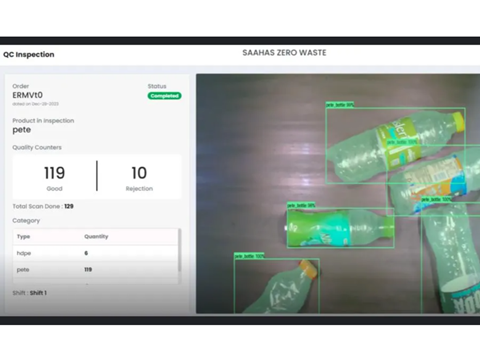
Saahas Zero Waste is utilizing Google’s open-source machine learning model, CircularNet, in a bid to sort plastic waste more effectively, responsibly manage over 500 tonnes of waste every day by 2026, and help improve recycling rates in India.
Despite being one of the world’s fastest-growing economies, India’s recycling infrastructure is still developing, and recyclable materials often end up in overflowing landfills.
In Delhi, for example, so-called ‘trash mountains’ – overflowing landfill sites thought to pile over 10,000 tonnes of unsegregated waste into tall piles over 200ft high – are described as ‘super emitter’ sites for methane emissions, polluting the air and contaminating water.
“India produces around 62 million metric tonnes of waste a year,” Chetan Baregar, associate director of marketing at Recykal, previously told Google. “But its waste management ecosystem is still in its nascent stages.”
After adopting CircularNet itself, Recykal claims to divert 50,000 metric tonnes of waste away from landfill every month by accurately detecting PETE, HDPE, and LDPE plastics, among other materials, at a rate of over 90%. Its measured production quality is also believed to have improved by 60%.
“If material isn’t going to be recycled, then it’s going to eventually end up as land, water or air pollution,” says Baregar. “Using the CircularNet AI technology, we’re helping brands reach their sustainability goals, providing governments with actionable insights, and sourcing businesses better and cheaper materials. The technology is helping to benefit India as a whole.”
Now Saahas Zero Waste plans to use CircularNet to alleviate strain on landfills by more effectively sorting recyclable from non-recyclable plastic waste and diverting around 90% of recyclable waste away from landfill. In turn, this is hoped to decrease contamination, improve recycling rates, and help India pursue a circular economy.
Apparently, CircularNet is capable of achieving 85-90% accuracy when detecting recyclable materials. While this system reduces reliance on manual workers, it is still expected to create economic opportunities in India while reducing the likelihood of sorting errors.
Saahas Zero Waste hopes that AI will help achieve a 10-12% improvement in revenue generation and benefit other Indian entrepreneurs in its sector.
Additionally, the model captures images at different points inside a material recycling facility and generates daily metrics and data. Recykal previously reported that it could use the information to help stakeholders, including processors, governments, and major brands, deliver ‘actionable insights’ and achieve producer responsibility.
“Saahas Zero Waste is committed to the evolving waste management ecosystem in India, aiming to responsibly manage over 500 tonnes of waste daily by 2026,” said Arun Murugesh, vice president, Sales and Marketing at Saahas Zero Waste. “Google’s CircularNet model is playing an important role by supporting automated AI-powered quality control systems that can be deployed efficiently at scale – and we’ve been greatly encouraged by early results.
“Improved quality assurance at waste recovery facilities and recyclers powered by CircularNet promises to improve resource recovery through closed-loop recycling. By combining technology with viable business models, we aim to contribute towards India’s vision of a circular economy.
“We also see AI-assisted partnerships as a driver to achieving larger impact, including livelihood generation, safer working conditions and greater ecological conscientiousness.”
In a LinkedIn post, Robert Little, sustainability strategy lead of Google’s Technical Services team, or gTech, commented: “Imagine a world where landfills are a thing of the past and valuable resources are endlessly circulated. This vision is becoming a reality thanks to AI-powered recycling technologies like Google’s CircularNet, an open-source machine learning model that I’m incredibly proud to be working on.
“These impressive results are achieved through AI-powered systems that can accurately identify and sort recyclable materials, reducing contamination and increasing efficiency. This not only benefits the environment but also creates economic opportunities.
“At Google and with our project CircularNet, we’re proud to be a part of this transformative journey. By collaborating with local communities, governments, and businesses, we’re helping to build a more sustainable future for India and beyond.”
Google has also published a new whitepaper, ‘An AI Opportunity Agenda for India’, outlining its view on how India can ‘maximize AI’s potential’.
In a recent episode of our Packaging Europe podcast, we spoke to Vikas Chhajer, chief sustainability and strategy officer at Gemini Corporation, to learn more about the company’s work to improve collection, sorting, and livelihoods in India’s informal waste sector and beyond.
In other news, Digimarc Corporation has released its new Digimarc Recycle sortation software; it has implemented Graphics Processing Units (GPUs) in an effort to almost halve costs and increase access for recycling and waste sortation facilities worldwide.
Google has also published a Plastic Free Packaging Design Guide in a bid to help the consumer electronics sector move away from mixed-material packaging and into plastic-free alternatives without sacrificing product protection, accessibility, aesthetic appeal, or the ability to dispose of the pack responsibly.
If you liked this story, you might also enjoy:
The ultimate guide to the Packaging and Packaging Waste Regulation in 2024
How are the top brands progressing on packaging sustainability?
Sustainable Innovation Report 2024: Current trends and future priorities
Everything you need to know about global plastic sustainability regulation













No comments yet